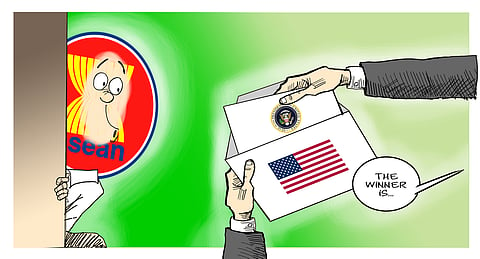
- NEWS
- the EDIT
- COMMENTARY
- BUSINESS
- LIFE
- SHOW
- ACTION
- GLOBAL GOALS
- SNAPS
- DYARYO TIRADA
- MORE

As the 5 November US presidential election draws closer, indications of shifts in policies that may impact investments, trade, and geopolitical stability are being intently monitored by markets around the globe.
One of the fastest growing regions globally, ASEAN (Association of Southeast Asian Nations) is particularly sensitive to shifts in US economic and foreign policies and how the US presidential elections will go — whether it results in continuity under Democrat Kamala Harris or an expected marked shift with the comeback of Republican Donald Trump — will have wide-ranging implications for ASEAN member economies.
At the moment, international risk consultancies like London-based BMI Country Risk and Industry Research (a Fitch Solutions company) are predicting a closely contested race, leaving markets and political observers across the globe on tenterhooks.
An immediate concern for economies in the region has to do with how US trade policies might change post-election, seeing how ASEAN countries have been beneficiaries of globalization and open trade policies, e.g., Vietnam, Thailand and Malaysia, which significantly rely on exports to the US to stimulate growth.
The imposition of tariffs by the victorious candidate in the US polls would have a deleterious effect on them and other export-driven economies in the region.
A protectionist US administration could lead to higher tariffs on goods exported from ASEAN, particularly in such sectors as electronics, textiles and agriculture, industries that are highly sensitive to changes in trade costs. New tariffs could significantly cut their competitiveness in the US market.
Meanwhile, an administration that would re-engage in multilateral trade accords could provide a major boost to the region.
There could even be renewed interest in the Comprehensive and Progressive Agreement for Trans-Pacific Partnership, from which the US, under then President Donald Trump, withdrew in 2017.
The re-entry of the US in the CPTPP could very well provide ASEAN with improved market access, reduced trade barriers, and stronger trade ties with the US.
Also, trade liberalization would enable the diversification of Southeast Asian markets, lessening dependence on China, and allowing countries in the region to have a larger role in global supply chains.
ASEAN economies in regional trade frameworks, like the Regional Comprehensive Economic Partnerships, could expect more integration with the US, leading to more solid trade flows and enhanced investments.
An important element in US foreign policy in the past decade has been its relationship with China. The intensified rivalry between the two superpowers offers both risks and opportunities for countries in Southeast Asia.
For instance, various ASEAN members share active accords with both China and the US, leaving them in a situation where they must adopt a tight balancing act if they are to continue maintaining relationships with both superpowers.
A US administration that would continue a hardline stance on China would see Southeast Asian nations under pressure to choose sides. US sanctions or restrictions on Chinese firms could disrupt highly integrated supply chains running through the region, particularly in such sectors as electronics and semiconductors.
But there are opportunities too for Southeast Asian markets that can be created by a continued US-China rivalry. For instance, as US companies look to diversify their supply chains away from China, ASEAN member economies like the Philippines, Indonesia and Vietnam could benefit from more investments in manufacturing.
The China+1 strategy — where you see US companies maintaining a base in China but with operations set up in neighboring countries — is already beginning to benefit the region, and this trend could increase after the elections (depending on who wins).
Likewise, in terms of geopolitics, Southeast Asia, the ASEAN could see an increase in engagement with regard to regional security issues, particularly in the South China Sea.
A US administration that will concentrate on solidifying its alliances in the Indo-Pacific may deepen its relationship with ASEAN member economies, stepping up enhanced regional security and balancing China’s growing influence in the region.
What if the candidate who comes out victorious is an isolationist, one whose priority and main preoccupation is making America great again, and the world, well, the world outside will just have to wait and/or fend for itself while he or she is trying to make it so?
